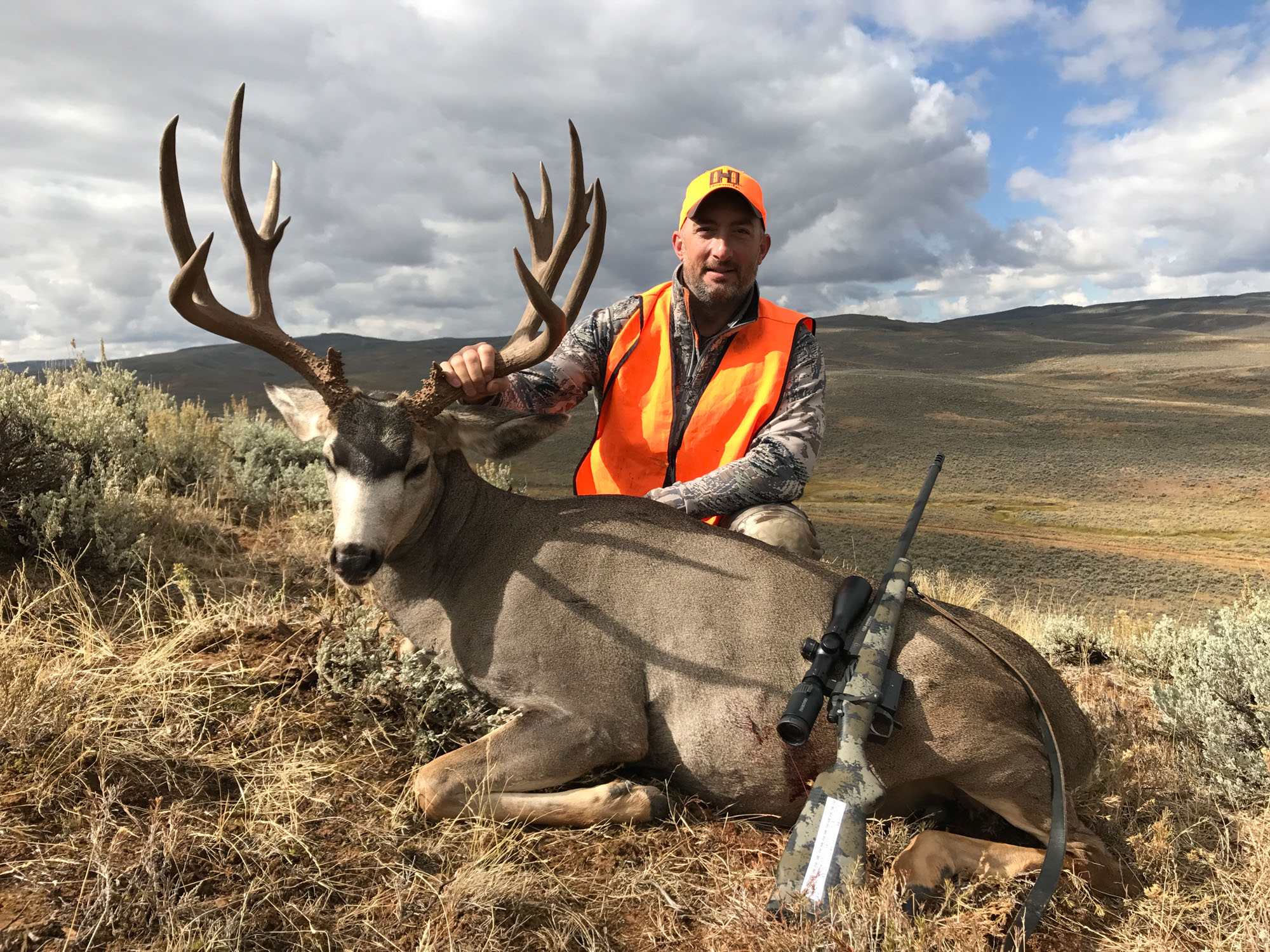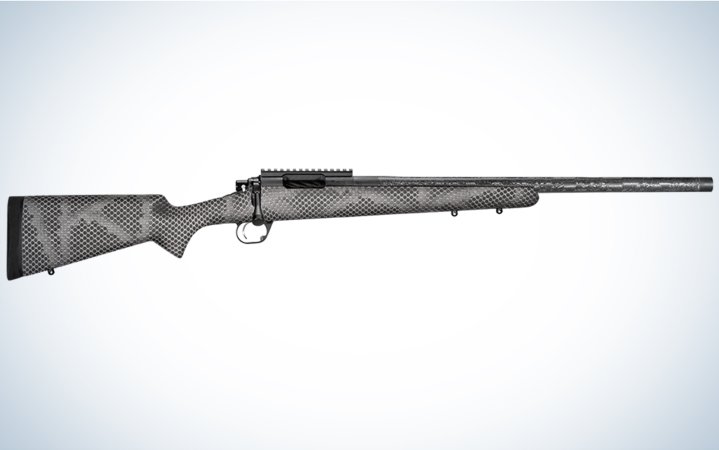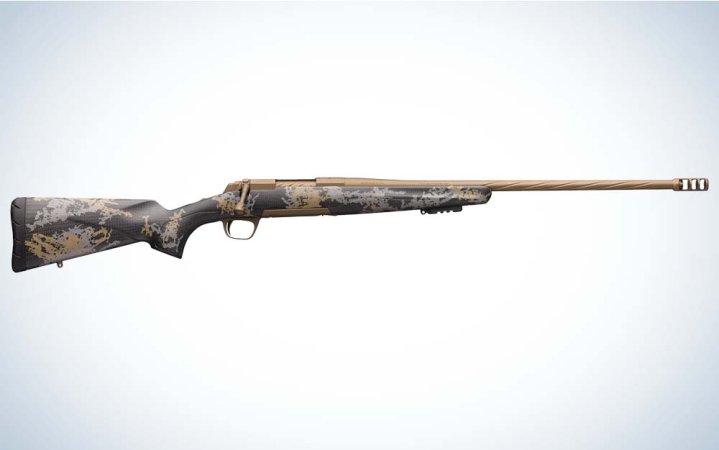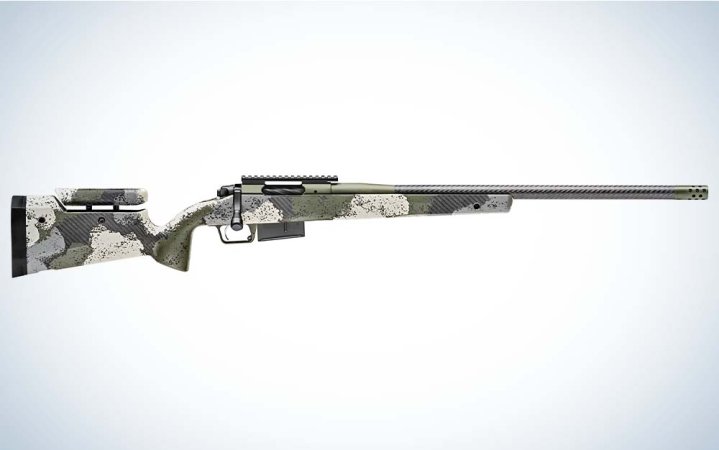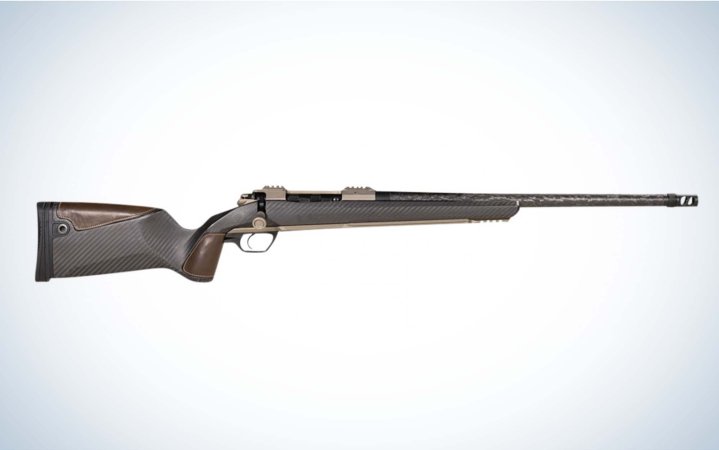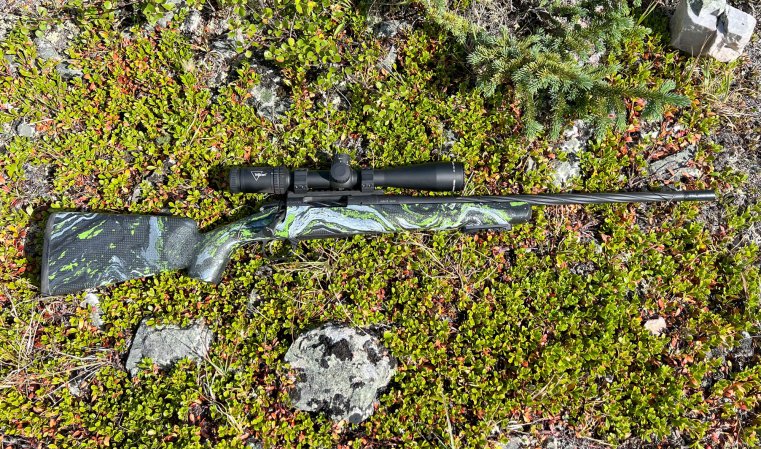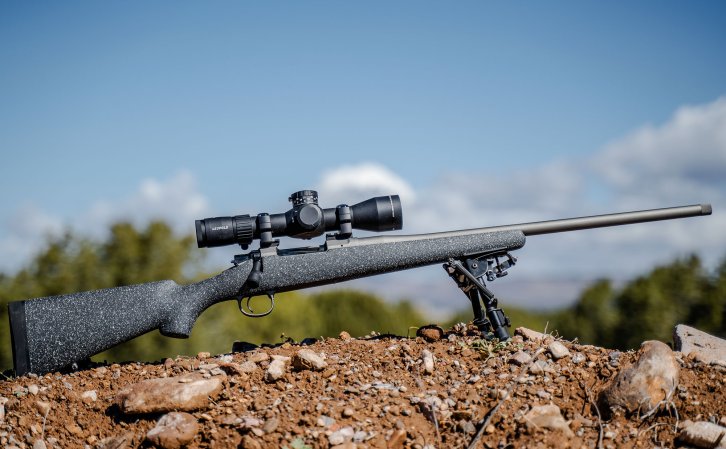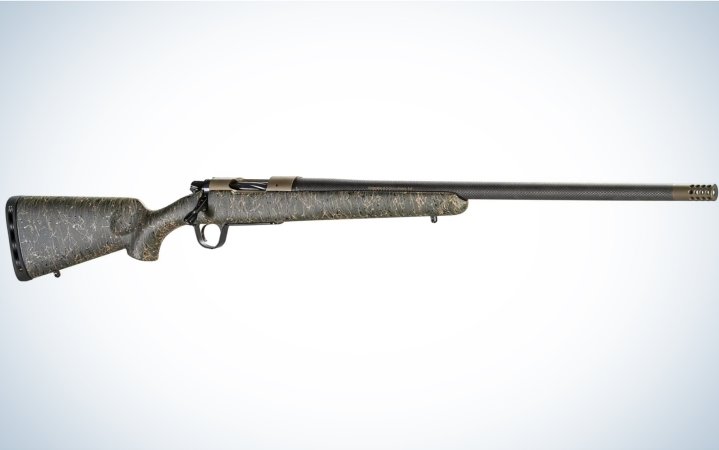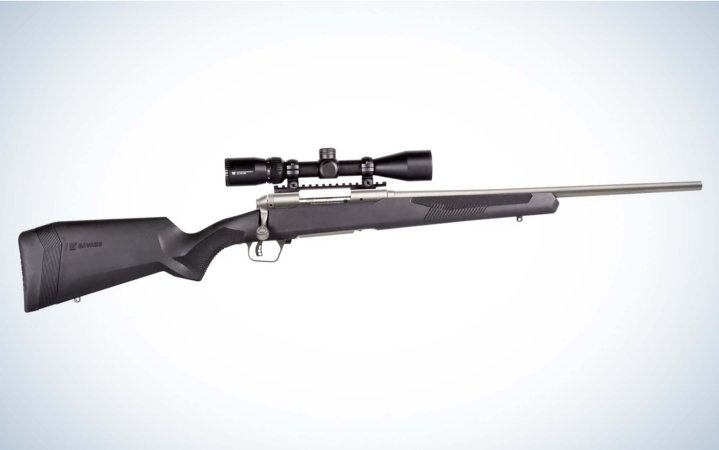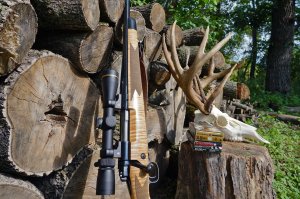We may earn revenue from the products available on this page and participate in affiliate programs. Learn More ›
The 6.5 PRC, officially introduced in 2018, has become popular for hunting big game and long-range shooting. The appeal of this short-mag, based on the Ruger .300 RCM, is easy to understand. It strikes a Goldilocks balance between large magnums, like the .300 Win. Mag., .300 Wby. Mag., and 7mm Rem. Mag., and the much maligned—but undeniably capable—6.5 Creedmoor and its peers.
Like many others I was quickly drawn to the 6.5 PRC—which stands for Precision Rifle Cartridge—and made it the basis for my ideal open-country hunting rifle. The 6.5 PRC’s design allows it to propel a host of good heavy-for-caliber 6.5mm bullets at velocities that lend themselves to fine accuracy and decisive terminal performance. It’s an excellent expression of the trends in modern cartridge design.
Now the long-term success of the 6.5 PRC isn’t guaranteed. We’ve had a slew of cartridge introductions over the last 25 years that have fizzled. Among all the short-mags, for instance, only the .300 WSM retains a meaningful following. And who remembers the super-short mags and their brief moment in the spotlight? Plenty of other interesting cartridges likewise started with a flicker of interest, ultimately failing to catch fire with the shooting public at large. A partial list to illustrate the point includes the .338 Federal, .17 Mach II, .17 WSM, .307 Marlin, .450 Marlin, .30 T/C, .30 Remington AR, .338 RCM, the Remington Ultra Mags, and so on.
That said, I think the 6.5 PRC has legs and its prospects for the future seem bright—though the cartridge has some challenges and drawbacks.

6.5 PRC Specs
- Bullet Diameter: 6.5mm/.264 inches
- Case Length: 2.03 inches
- Overall Length: 2.755 to 2.955 inches
- Case head diameter: .532 inches (.540-inch bolt face)
- Parent Case: .300 Ruger Compact Magnum
- Maximum pressure: 65,000 psi
- Twist: 1:8 inches
- Typical bullet weight: 120 to 156 grains
- Typical velocity: 2,900 fps with a 147-grain bullet
- Year introduced: 2018
6.5 PRC History
Though unveiled in 2018, the 6.5 PRC had been in the works since 2013. The driving force behind its development was George Gardner, owner of GA Precision. He wanted to create a hard-hitting long-range round for hunters and competitive shooters, particularly those in the Precision Rifle Series. According to PRS rules, cartridges cannot have muzzle velocities in excess of 3,200 fps. In addition to that restriction, Gardner also wanted to run the cartridge through short-action receivers. These two parameters are why he decided on a 6.5 mm/.264-caliber round. (As a side note it is interesting how no one in the PRS or NRL are shooting cartridges that push the 3,200-fps limit, instead favoring milder 6mm rounds like the 6 Dasher and 6mm GT.)
“I wanted the highest BC bullet you can push at 3,200 in a short action,” Gardner said. “The 6s can be pushed that fast, but they have lower BCs. The 7 mils have higher BCs but can’t be pushed at 3,200 fps in a short action. The lack of bullet selection in the .25 and .270 ruled those out—so that’s why I settled on the 6.5.”
6.5 SAUM Detour
When considering a parent case for a 6.5 short mag, Gardner had three choices. He dismissed the Winchester Short Magnum family right away because its case capacity was larger than was needed. The Ruger Compact Magnum, which is made by Hornady, was his first pick. But back in 2013, when he approached Hornady to make a 6.5 short mag, they passed because they were already making as much brass as they could to satisfy the demand for ammo during those years of panic buying. That left Gardner with the Remington Short Action Ultra Mag. He was able to locate several hundred thousand pieces of 7 mm SAUM brass, and so the 6.5 SAUM/4S was born.
Compared to the 6.5 PRC, the 6.5 SAUM is about 50 fps faster, but the SAUM case has a rebated rim, which adds cost and can make reliable feeding more of a challenge.
And though the 6.5 SAUM developed a following, as soon as Hornady had the bandwidth to produce the case Gardner wanted, he pivoted to the 6.5 PRC. “The PRC was just more commercially viable,” Gardner said. “It works with a greater variety of powders and a broader range of guns and is a little more versatile than the 6.5 SAUM.”

6.5 PRC in the Field
That versatility was evident as soon as people started hunting with it. I got to use the round before it was publicly announced, taking it on a mule deer hunt in Utah that showcased its virtues. The terrain I hunted included everything from open sage flats, to exposed rocky escarpments, to dense timber, to lung-busting mountains.
I don’t recall what my rifle weighed, but it was comfortable to carry over long distances. And once we spotted my buck my guide and I had to cover about a mile and a half as quickly as possible to get set up.
That stalk turned into a prolonged waiting match as the buck bedded down with a handful of other deer about 450 yards from our position, which was among some boulders on a ridge. The ground dipped between us and the deer so we couldn’t stalk any closer without getting busted.
After a short eternity the buck got up and started moving away through the sage. He paused broadside for a moment and my shot with the then brand-new 143-grain ELD-X anchored him.

6.5 PRC Ballistics
While there’s nothing magic about the 6.5 PRC, it is possible to demonstrate the niche it fills with some numbers. Let’s take that 143-grain ELD-X bullet I used. With a muzzle velocity around 2,900 fps and a 100-yard zero, its drop at 400 yards is 23 inches. Comparing that to a couple other high-performance cartridges—a .308 Win. shooting Berger’s 168-grain Hybrid Hunter at 2,680 fps and a 7mm Rem. Mag. shooting a 160-grain Nosler AccuBond at 3,000 fps—we can see how the 6.5 stacks up rather favorably.
On the one hand, it shoots flatter than the .308, while generating about the same felt recoil. On the other, it runs neck-and-neck with the 7mm Rem. Mag. in terms of drop at 400 yards—even though the 7mm generates 32 percent more recoil.
Thanks to the high BC of the 143 ELD-X, it retains more velocity at 400 than the other cartridges and that advantage will only become more significant at longer distances. You can see how it is less affected by a 10-mph crosswind at 400 yards, and how it retains its energy more efficiently downrange.
I used 1000 foot-pounds of retained energy to illustrate the point. The .308 dips below that 1000-foot-pound threshold at 830 yards, and the 7mm Rem. Mag. does so at 985 yards. By contrast, the 6.5 PRC is out at 1085 yards before it drops to 1000 foot-pounds.
Note that all these numbers were generated using the same rifle setup and environmental conditions.
| Cartridge | 6.5 PRC | .308 Win. | 7mm Rem. Mag. |
| Bullet | 143-gr. ELD-X | 168-gr. Ber. Hybrid Hunter | 160-gr. AccuBond |
| Ballistic Coefficient | .315 G7 | .251 G7 | .244 G7 |
| Muzzle Velocity | 2910 fps | 2680 fps | 3000 fps |
| Muzzle Energy | 2688 ft.-lb. | 2679 ft.-lb. | 3197 ft.-lb. |
| Felt Recoil | 17.82 ft.-lb. | 17.01 ft.-lb. | 23.58 ft.-lb. |
| Velocity @ 400 yd. | 2456 fps | 2145 fps | 2414 fps |
| Energy @ 400 yd. | 1915 ft.-lb. | 1761 ft.-lb. | 2069 ft.-lb. |
| Drop @ 400 yd. | 23.07 in. | 29.68 in. | 22.48 in. |
| 10 mph Drift @ 400 yd. | 7.18 in. | 10.27 in. | 8.75 in. |
| 1000 ft.-lb. Energy Threshold | 1085 yd. | 830 yd. | 985 yd. |

Going Long with the 6.5 PRC
One thing to note with the 6.5 PRC is that as the range to the target increases it quickly leaves its competition in the dust. At 400 yards it is beginning to outpace the 7mm Rem. Mag. When it hits 800 or 1000 yards it has outclassed it and does a better job downrange than other magnum rounds like the .300 Win. Mag. or .300 Wby. Mag.
For example, even when shooting a .300 Win. Mag. with an optimized bullet like the 178-grain ELD-X, the 143-grain ELD-X from the 6.5 PRC has less drop and drift at 1000 yards. Where the 178 has dropped 260 inches at 1000, the 143 has dropped 242 inches at that distance.
And if you swap that 178 ELD-X with more common .300 Win. Mag. hunting bullets in the 150- to 180-grain class that disparity becomes more pronounced.
Where the heavy-hitting .300s shine in ELR applications is with impact signature. A .300 PRC shooting a 220-grain A-Tip (which is one of my preferred ELR loads) will recoil harder than a 6.5 PRC and cause more shooter fatigue, but it is much easier to spot hits and misses at distances of a mile or more than with the 6.5 PRC.
READ NEXT: Best Long Range Calibers
Top Rifles Chambered in 6.5 PRC
I’ve shot quite a few rifles chambered in 6.5 PRC and, as a class, they’ve all shot well. None have been dogs. Some have been exceptional.
Each year the number of manufacturers offering 6.5 PRC rifles has steadily grown. For the time being the cartridge’s prospects look good. Here are some of the best rifles in 6.5 PRC to choose from at the moment:
Seekins Havak HIT
The Havak HIT is a remarkable value and won a couple of awards in our annual gun test in 2022. This modular precision rifle is innovative, ergonomic, and incredibly accurate. The 6.5 PRC Havak HIT I reviewed averaged .542-inch five-shot groups with factory ammo. The chassis stock is minimalistic but functional. It folds for compact carry and adjusts for critical dimensions for a custom fit. The full-length ARCA rail on the fore-end incorporates Seekins’s proprietary attachment system. And the cherry on top is that it can switch barrels and bolt heads in a flash to change calibers.
Seekins Havak Pro Hunter 2
This rifle took top honors in Outdoor Life’s gun test when it was introduced and it remains one of the best values in a high-end technical rifle. One great innovation that Seekins incorporated into the 6.5 PRC model is the 3-round detachable carbon fiber magazine that can accommodate an overall cartridge length of 3.14 inches. This gives the shooter the option to run handloads with longer, heavier bullets and still be able to feed through the rifle’s short-action design.
Proof Research Elevation
This lightweight hunter tips the scales right around 6 pounds and comes with a 24-inch carbon fiber barrel with a 1:7.5 twist in 6.5 PRC. It is built on an excellent Zermatt Arms Origin action, has a TriggerTech trigger, uses a BDL hinged floorplate on the magazine. Like other Proof rifles it has a ½-inch accuracy guarantee. As an all-around premium hunting rifle it is an outstanding choice.
Proof Research Glacier Ti
If you are in need of a true ultralight mountain rifle, the Proof Glacier Ti is a step above the pack—though you’ll pay for the privilege. Editor in chief Alex Robinson has been hunting with the Glacier Ti for the last year and we’ve had a hard time prying the 5.5-pound carbon fiber wonder from his hands.

He put it to its intended use on a Dall sheep hunt, where he used it to take a beautiful ram at 100 yards with Federal’s 130-grain Terminal Ascent. He’s also shot a couple whitetails with it, both using Federal’s 140-grain Fusion.
Browning X-Bolt Mountain Pro
Staff writer Tyler Freel has a lot of trigger time behind this rifle, both in 6.8 Western, which he reviewed at length, and in 6.5 PRC. He carried the 6.5 PRC on a recent hunt in northern Alberta and used it to kill an impressive wolf.

The rifle weighs about 6.25 pounds, so it is portable, and comes with a durable and well-designed carbon fiber stock. The 24-inch barrel is made of spiral fluted stainless steel. It comes with a trigger that can be adjusted from 3 to 5 pounds.
Springfield Armory Waypoint 2020
This rifle, introduced during the pandemic, was Springfield’s first foray into bolt-action rifles. I took it on a deer hunt in Colorado where my buddy Cody Arnold and I both killed fantastic whitetail bucks with it in 6.5 PRC. Both shots were over 500 yards in windy conditions, but that’s where the 6.5 PRC excels.

This rifle is ideally suited to Western hunting. It is accurate and has lots of smart features. It comes with five QD cups on the stock, M-Lok slots on the fore-end, and feeds from AICS pattern magazines. In its lightest trim, with a carbon fiber barrel, it weighs just over 6.5 pounds.
Gunwerks Nexus
This is a fascinating new rifle from Gunwerks that I’ve been shooting for the last few months. It blends high-tech innovation (switch-barrel design, integrated ARCA rail, recessed Picatinny rail section, carbon-fiber barrel) with old-school touches like the leather inserts on the grip and cheek piece and the three-position safety on the bolt shroud.
AllTerra Arms Mountain Shadow Steel
If you want to pull out all the stops and go with a full custom build, take a look at the rifles from AllTerra Arms. I’ve got their Mountain Shadow Steel in 6.5 PRC that I’ve carried on a few hunts, including a grueling two-week hunt for bighorns in Alberta last fall. The rifle has lots of trick touches to enhance performance and accuracy. To appreciate all that this build brings to the party, check out this review.
Nosler Model 21
The Model 21 was an instant hit with the Outdoor Life gun test team. I took an early version chambered in .375 H&H to Africa, where it performed like a champ, but the 6.5 PRC version is a better all-around option for North American hunters. Executive editor Natalie Krebs is a case in point. She’s used her Model 21 in 6.5 PRC on a DIY hunt to kill an elk of a lifetime in Utah and it has become her go-to deer rifle as well.

While the lines of the Model 21 are undeniably traditional, under the hood it has modern elements like tool-less takedown for the bolt, a keyed recoil lug that won’t slip, and other touches.
Christensen Arms Ridgeline
We’ve had good experiences with the Christensen Arms Ridgeline. It is a solid choice in that $2,000-price range. The 6.5 PRC version of the rifle has a 24-inch carbon fiber barrel with a 1:8 twist and comes with a radial muzzle brake with a 5/8-24 thread. The Ridgeline features a TriggerTech trigger in the stainless-steel action. The carbon-fiber stock has bedding pillars for a strong, repeatable connection between action and stock.
Savage 110 Apex Storm
This is a budget-priced package based on Savage’s eternal 110 action. For $820 you get a solid rifle topped with a Vortex 3-9×40 Crossfire II scope that has a BDC holdover reticle. The synthetic stock is durable, functional and adjusts for length of pull. The AccuTrigger system is user adjustable as well. The rifle is designed with a free-floating barrel and free-floating bolt head that both help with accuracy.

6.5 PRC Ammo
In the beginning there were only two factory loads for the 6.5 PRC, Hornady’s 143-grain ELD-X and the 147-grain ELD Match. Both are still great options for hunting and target shooting, respectively. Since then, the variety of 6.5 PRC ammunition has exploded, and depending on your needs (and budget) there are many offerings to choose among.
Hornady
- 147-grain ELD Match (target)
- 143-grain ELD-X (hunting)
- 130-grain CX (non-lead hunting)
Federal
- 130-grain Terminal Ascent (hunting)
- 140-grain Fusion (hunting)
- 130-grain Trophy Copper (non-lead hunting)
Berger
- 156-grain Extreme Outer Limits (EOL) (hunting)
- 140-grain Elite Hunter (hunting)
Remington
- 140-grain Premier Long Range (hunting)
Winchester
- 142-grain ABLR (hunting)
- 140-grain BTHP (target)
- 125-grain Copper Impact (non-lead, hunting)
Norma
- 143-grain Bondstrike (hunting)
- 140-grain Whitetail (hunting)
Browning
- 140-grain Gameking (hunting)
- 140-grain Polymer Tipped (hunting)
Nosler
- 140-grain AccuBond (hunting)
- 140-grain Ballistic Tip (hunting)
- 142-grain AccuBond Long Range (hunting)
- 120-grain E-Tip (non-lead hunting)
Barnes
- 127-grain Vor-TX Long Range (non-lead, hunting)
Black Hills Ammunition
- 143-grain ELD-X (hunting)
Reloading the 6.5 PRC
The 6.5 PRC is a fun and easy cartridge to reload thanks to a wide range of excellent available components. The list of quality .264-inch caliber bullets probably merits an article on its own. And when it comes to brass and powder there’s no shortage there either.
Gittings One and Done
If you want to go the easy route for one load that will work well for hunting and target shooting, follow my friend and shooting partner Chris Gitting’s lead. He’s used this load to shoot numerous elk and to place very well in ELR shooting competitions.
- Bullet: Berger 156-grain EOL
- Brass: Lapua
- Primer: 215M (Gittings opts for magnum primers in the 6.5 PRC)
- Powder: 57.5 grains H1000
With a 26-inch barrel shoot for a target velocity around 2920 fps. Start with a lower powder charge, of course, and work your way up to that speed. Once there, call it good. From a 24-inch barrel, lower your target velocity to 2890 fps or so.

Best 6.5 PRC Bullets
We’ve already touched on a number of the best projectiles to use in the 6.5 PRC. Bullet weights range from 120 to 156 grains for the 6.5 PRC and there’s no reason not to take advantage of the cartridge’s ability to drive long, sleek bullets at speeds around 2900 fps.
For match shooting the Hornady 147-grain ELD-M, Berger 156-grain EOL, Vapor Trail 139-grain BTHP, Nosler 140-grain RDF, Lapua 139-grain Scenar, and Sierra HPBT in 140-, 144- and 150-grain weights, are among the best.
Hunters using traditional lead bullets should look at the Nosler 140-grain AccuBond, Hornady 143-grain ELD-X, Sierra 140-grain Tipped Gameking, Berger 140-grain Hunter, Berger 156-grain EOL, Federal 130-grain Terminal Ascent, Speer 140-grain Polymer Tipped, and Nosler 140-grain Ballistic Tip.
If you want to go non-leaded, the Barnes 127-grain LRX, Hornady 130-grain CX, Nosler 120-grain E-Tip, and Lehigh Defense 130-grain Controlled Chaos are good picks.
Best 6.5 PRC Brass
High-quality brass for loading the 6.5 PRC is available from Lapua, ADG, Peterson Cartridge, and Hornady. You won’t go wrong with any of them.
Best Powders for Reloading the 6.5 PRC
Again, there’s a plethora of options for reloaders when it comes to the 6.5 PRC. Powders like H1000, Retumbo, RL 26, RL 22, Accurate Magpro, Winchester StaBall HD, and IMR 4831 are worth considering. In the Vihtavuori world, look at N170, N565, N570, and even 24N41.
Primers for the 6.5 PRC
Most reloading data suggests using large rifle primers, though you can experiment with magnum primers too. I mostly shoot Federal 210Ms, but Federal 210s, Winchester Large Rifle, CCI No. 200, and Remington 9 ½ primers will all work.
Best 6.5 PRC Reloading Dies
You can get quality die sets from Hornady, RCBS, and Redding. I’ve used them all and like them quite a bit. You can also go the premium route if you want to splurge and pick up a Short Action Customs Modular Sizing Die, which is the cat’s ass.

6.5 PRC Pros and Cons
The pros of the 6.5 PRC are many. It’s modern, efficient design makes it inherently accurate, and it is optimized for long-range work. It can leverage many of the best hunting and match bullets on the market today and is ideal for all non-dangerous game.
As its popularity has grown, so has the availability of rifles and ammunition. Early adopters might have been concerned over the ability to find ammunition, but that is no longer an issue.
The 6.5 PRC is also simple to reload and as the pinch on components continues to diminish, reloaders will find it easy to keep their presses running.
In terms of the cartridge’s cons, the major one has to do with its overall length. Most rifle makers have built their 6.5 PRCs on short-action designs. Many short-action receivers and magazines can only accommodate cartridges up to 2.8 inches in length or just a hair longer. Some stretch that to over 2.9 inches.
So when loading the 6.5 PRC long to take full advantage of the cartridge, it won’t run in some of these shorter actions. That’s why some 6.5 PRCs are built on standard long (.30/06-length) actions. There are also medium-length actions that split the difference. For instance, the action on my Ultimate Open Country Rifle is a Defiance XM medium-length action, which can accept magazines for cartridges measuring 3.25 inches and is perfect for the 6.5 PRC but isn’t very common among factory rifles.
Frequently Asked Questions
What is the largest grain bullet for 6.5 PRC?
Currently, Berger’s 156-grain EOL bullet is the heaviest bullet that’s in common use with the 6.5 PRC. The sweet spot for the cartridge are bullets weighing 140 grains or more, though there are good options from 120 to 130 grains too.
Why is 6.5 PRC so popular?
The 6.5 PRC takes advantage of today’s best bullets and our understanding of modern cartridge design to deliver long-range performance in a cartridge with moderate recoil. That, coupled with its fine accuracy, has driven its popularity.
What size is a 6.5 PRC?
The overall length of the 6.5 PRC runs from 2.8 to 2.955 inches, though some handloaders load the round a bit longer than that.
Does the 6.5 PRC require a long action?
Since the overall SAAMI length of the 6.5 PRC is 2.955 inches, the cartridge won’t run in every short-action receiver on the market, some of which top out at 2.8 inches. In those cases a long- or medium-length action is called for.
How many rounds will a 6.5 PRC barrel last?
The 6.5 PRC is a high-performance cartridge but not a real barrel burner. Assuming you don’t beat the snot out of your hunting rig you should get at least 2,000 rounds out of a barrel and, with proper care, maybe more. Competition shooters who run their rifles hard, and who need peak performance, will probably look to replace barrels around 1,500 rounds.
How far can a 6.5 PRC shoot accurately?
The 6.5 PRC is effective for ELR applications, meaning it can make hits at 2,000 yards or more. Even regular 6.5 PRC rifles—assuming they are well made—are fully capable on targets beyond 1,200 yards.
Final Thoughts on the 6.5 PRC
When choosing a hunting rifle there’s always going to be a contingent for whom more equals more. These are the folks that happily shoot whitetails with their .300 magnums and would never dream of tackling a larger animal like an elk, moose, or big bear with something that didn’t rock their world when they pulled the trigger. They would probably still feel undergunned with a 6.5 PRC.
But for the rest of us, the 6.5 PRC is among the best choices available. It avoids the stigma associated with its smaller sibling and propels those wonderful high-BC 6.5 bullets about 200 fps faster than the cartridge which shall not be named.
Its recoil is on par with the .308 Winchester, making it manageable for all shooters. And it shoots flat and hits like a sledgehammer—or at least like a 3-pound splitting maul—at distance.
Whereas the interest in most cartridges built on the short-magnum principle soon faded, it seems the 6.5 PRC is destined to join the ranks of those that hang around for the long haul.

